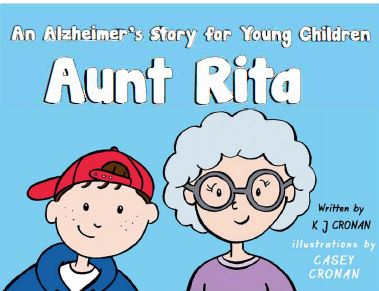An Alzheimer's Story for Young Children: Aunt Rita
Reading Guide
By: KJ Cronan
Illustrated by Casey Cronan
About this Program
The MSU Extension Alzheimer's Dementia Awareness for ChildrenStorybook program is designed to teach children about a form of dementia.
The goals of the program are:
1) increase awareness and knowledge about Alzheimer’s (a form of dementia) and
2) provide supportive resources to children and families when they have a loved one
diagnosed with Alzheimer's.
The authors of this reading guide are:
- Taylor Mullen, MSU Extension 4-H & Agricultural Agent, Lake County
- Marsha A. Goetting, MSU Extension Family Economics Specialist
- Keri Hayes, MSU Extension Program Assistant
Brief Summary
Harry is an active 4th grader who loves school, sports, drawing and his friends. But the thing he cherishes most of all is the relationship he shares with his Aunt Rita. A lot of Harry's most impactful memories are spent with his Aunt Rita and their adventures together. He soon discovers that his Aunt Rita has Alzheimer's. This illness effects an adult's brain by impeding their memory and changing their thinking and behaviors. As Aunt Rita's memory continues to decline, Harry remains a positive light in her life and continues to nurture their sweet connection while helping his family do the same.
Questions to Ask
- Harry loves spending time with his Aunt Rita. What are some of the activities they do together?
- How does Harry's dad explain the changes that are happening with Aunt Rita's behaviors?
- What does the family do after Aunt Rita was moved into a nursing home?
- Do you think it's important for Harry to remain positive and visit his Aunt Rita in the nursing home even though she may not always remember? Why or why not?
Activity Enrichment
In the story, Harry still made it a priority to spend time with Aunt Rita after she was diagnosed with Alzheimer's. If you have a family member experiencing Alzheimer's like Harry's and you are trying to find a way to connect with that person, here are a few fun and simple ideas:
- Put on some music: (ask for their input if they can remember a favorite memory) and sing and dance along.
- Sit down and read a book together: either the parent reading the book to the youth and the senior, the senior reading the book to the youth (should they still be confident doing so) or the youth reading the book to the senior.
- Play with animals: look into visiting an animal shelter or even a petting zoo. Animals are a wonderful stress reducer and encourage people to display their gentler sides.
- Spend time in nature: take a walk around the park and look for various birds or butterflies, enjoy a picnic on the grass. Spending time outdoors can help your loved one feel more connected to you.
- Make something together: this can be as simple as an ice cream sundae or even a batch of no bake cookies. Please ask for supervision if you are planning to use the oven or stove.
- Do an art or craft paint a self-portrait together or possibly flowerpots that you can put floral arrangements in and have as a keepsake.
- Play some games or puzzles: Bingo, Go Fish, Uno or jigsaw puzzles. Not only are these
silly and lighthearted fun but they are also great
cognitive practice for those with Alzheimer's.
Common Reactions
- Patience, Empathy and Adaptability: Youth may need to rely on their family to help explain the effects of Alzheimer's
and how it is affecting their loved one. Youth can help a person experiencing Alzheimer's
by being patient, empathetic and adaptable.
- Nurture Connection: Youth may want to help take care of a family member or friend who is experiencing Alzheimer's. As a parent you can help your child find their own way of connecting with that person and let them continue to nurture their relationship.
Other Books in this Program
Other Storybooks and Reading Guides can be found at: https://www.montana.edu/extension/alzheimers/booksandreadingguides.html
Funding for purchase of the storybooks in this program have been made possible by
a grant from the Montana Geriatric Education Center at the University of Montana,
AARP Montana, and by the Endowment fund from National Extension Association of Family
& Consumer Sciences (NEAFCS).




